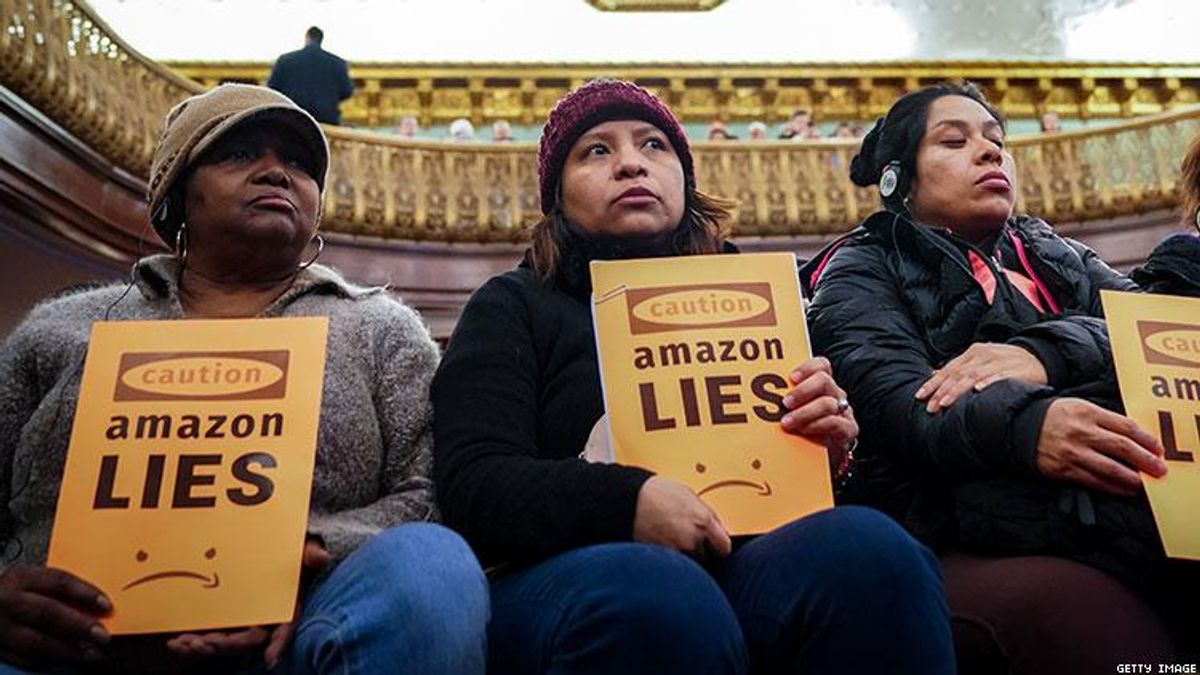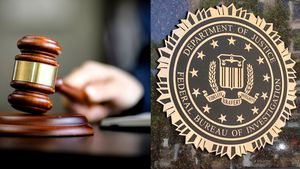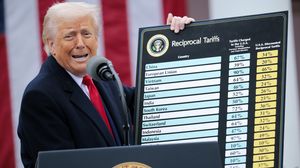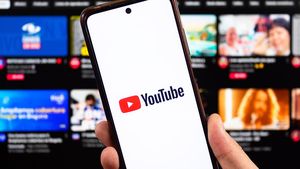Though Amazon decided not to build a new corporate headquarters in New York, citing resistance from city residents and lawmakers alike, local queer organizers warn that the fight is far from over, especially for working-class queer and trans New Yorkers of color.
"We are in a housing crisis in New York," says Josselyn Atahualpa, a 27-year-old organizer with Queens Neighborhood United. "We don't need corporate tech coming in and making it worse."
Two years ago, Amazon announced that it planned to expand beyond Seattle by building a second headquarters in another American city. Following a nationwide search to find a location for HQ2, the online retailer decided in November to split the project between Queens, New York, and Arlington, Virginia, two cities that had collectively offered Amazon more than $2 billion in tax credits, rebates, and other incentives to get picked.
Despite the 25,000 jobs Amazon promised to bring to each location, concerned Queens residents feared that those jobs would mostly go to people from outside the community who would then move to Queens and further gentrify Long Island City -- a majority non-white, multilingual neighborhood with a sizeable immigrant population across the East River from Manhattan -- raising rents and displacing longtime residents in the area and along the 7 train line in the process.
"Affordable housing is already scarce in New York City," Atahualpa tells Out. Corporate tech giants like Amazon moving there "just accelerates the rates of displacement, which we already know will hit the most vulnerable people, including people of color, first."
Queens community members also worried that an Amazon homebase could pose a threat to the 1.1 million immigrants and 262,000 working-class people who call the borough home, says Lena Afridi, the Association for Neighborhood Housing and Development's 33-year-old Director of Economic Development Policy.
"Amazon has been union-busting and collaborating with ICE for a long time," Afridi says, referring to a leaked Amazon-produced training video that told workers a union would "jeopardize everyone's job security" and the company's attempts to pitch facial recognition surveillance technology to U.S. Immigration & Customs Enforcement. "Queens has a large immigrant working class, so it's something people are thinking about when they think about the direct impact an Amazon headquarters would have right in our backyard."
Local groups like Queens Neighborhood United, Make the Road, Desis Rising Up & Moving, CAAAV Organizing Asian Communities, PrimedOut NYC, and the New York City branch of the Democratic Socialists of America mobilized quickly, organizing protests and other actions aimed at keeping Amazon out of New York. Their efforts soon paid off; Amazon canceled the Queens project in February, citing local opposition, much to the dismay of New York Mayor Bill de Blasio and Governor Andrew Cuomo, who is reportedly trying to get Amazon founder Jeff Bezos to reconsider his decision.
Though their efforts to keep Amazon out of Queens were successful, local organizers say that they're not about to rest on their laurels. New Yorkers still lack universal rent control and other basic housing protections needed to gird themselves against the rent hikes and displacement that a giant corporate headquarters, like the one Amazon proposed, could bring with it to their city. These protections are exponentially necessary, they say, for working-class queer and trans immigrants of color, as well as anyone who shares one or more of those identities, as these residents would also have to contend with housing discrimination, tenant harassment, and over-policing on top of whatever impact a tech-induced wave of gentrification would have on their communities.
"Anything that makes it hard for people to live in Queens makes it harder for queer people and people of color to live in Queens," Afridi says.
When asked if they think housing rights are a queer issue, Afridi says yes, "100 percent."
Atahualpa agrees that housing rights are a queer issue, adding that she rarely sees housing prioritized in the greater LGBTQ+ advocacy and nonprofit sphere, which has historically focused on issues concerning white cis gays from wealthy and middle class backgrounds. For her, the connection is so obvious as to warrant no explanation.
"It's hard to explain something that is a lived experience for some but not for others," she says.
Although state laws protect queer and trans New Yorkers from housing discrimination on the basis of sexual orientation, gender identity, and gender expression, nearly half of all LGBTQ+ Americans lack such protections. But nondiscrimination protections don't prevent discrimination from happening; if it did, New York City housing wouldn't still be so highly segregated some 51 years after the federal government signed the 1968 Fair Housing Act into law, which protects citizens on the basis of race and other categories. What nondiscrimination laws do offer is legal recourse to seek justice should discrimination occur. This framework still puts the onus to seek justice on the victims, and not every victim of housing discrimination will. Others simply can't. People who are undocumented, for example, would risk detention and deportation should they try to seek justice for housing discrimination under the American legal system.
That's why we need stronger rent laws like universal rent control and other tenant protections along with existing nondiscrimination laws, says Michael Cavadias, a 45-year-old organizer with the NYC DSA's housing working group of Lower Manhattan.
"If we win on rent regulation and win much stronger laws, then people who might not have been able to survive in city can stay and thrive without the crushing terror of being thrown out of their home at any time," says Cavadias. "When people have security in their basic needs, they're more free to be themselves and they're more free to live their lives and not be weighted down by the constant worry of basic survival."
Amazon might not be building a new corporate headquarters in Queens, but gentrification and displacement have been impacting the borough long before the online retailer announced its canceled homebase, and any number of other tech giants could easily try to do the same thing in the future. Till then, organizers say, New Yorkers can focus on building coalitions and working together to secure the kind of housing protections they'd need to stand their ground should a Facebook, a Google, or an Amazon try to do something like this again.
"There is power in creating a united front," says Atahualpa. "That's how we can take out Amazon."
RELATED | South Dakota Lawmakers Kill Anti-Trans Bill As More Pop Up Nationwide
























































































